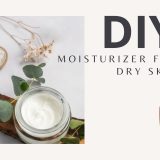HOW DO WE KEEP OUR SKIN BARRIER HEALTHY?

Our outer skin layer (the epidermis) forms the skin barrier and plays a vital role. As the name ‘barrier’ suggests, this natural skin layer protects our skin from harmful external influences. To give you a clear picture, you can compare the skin barrier to the building blocks of a house. The building blocks protect the house from external influences such as wind, cold, heat, and rain. Essentially, the skin barrier does the same and shields us from external factors such as:
- UV rays from the sun
- Light from our phones/tablets, etc. (blue light)
- Environmental pollution
- Aggressive or incorrect skincare products
- Taking showers that are too hot
But also stress, diet, and lack of sleep can disrupt the skin barrier in the long term (internal factors). When the skin barrier is compromised, these external factors can more easily penetrate the skin and cause damage. Additionally, the skin is not able to retain moisture effectively, leading to dehydration.
The characteristics of a disrupted skin barrier include:
- red skin
- (quickly) irritated skin
- comedones
- pimpels
- hyperpigmentation (pigmentspots)
- fine lines
- wrinkels
- dull skin
- dehydrated skin
- itchy skin
Often, people have a combination of one or more of the factors mentioned above. But fortunately, the skin barrier can also be restored.
How do we keep the skin barrier healthy?
Start by reversing the factors mentioned above, for example, avoiding hot showers and protecting your skin from the sun using the right sunscreen. Also, it’s good to scrutinize the products you use daily. It’s possible that the products you’re using are too aggressive or not suitable for your skin type. It’s also not advisable to use cleansing brushes as they can be too harsh. If you wear a lot of makeup, it’s better to cleanse your skin twice with a cleanser.
When your skin barrier is disrupted, your skin may also be dehydrated, as mentioned earlier. In that case, it’s good to add a serum with hyaluronic acid to your daily routine. Hyaluronic acid helps retain moisture in the skin, thereby firming and soothing it.
Redness can also be caused by a disrupted skin barrier, but genetic predisposition often plays a role as well. How it develops varies from person to person. For some, it’s genetic, for others, it’s due to incorrect product use. The skin is often red when there are inflammations present, such as pimples. It’s important to soothe the skin well with the right products in such cases.
Hyperpigmentation in the form of age spots or post-inflammatory hyperpigmentation (PIH) – pigment spots after inflammation, is also caused by a disrupted skin barrier. The sun essentially has “free access” to cause pigmentation damage in the skin when it’s not properly protected and isn’t capable of protecting itself. This also happens when you don’t protect yourself daily with an SPF against the sun.
Wanna check your skincondition? Go to a practice for a consultation and see what your therapist can do for you. Goodluck!
Love, Fabienne


Marieke
Altijd blij met jouw tips! Ze hebben me geholpen mijn recente acne uitbraak weer onder controle te krijgen. Als ik in de buurt ben kom ik zeker langs bij Huid Rotterdam 🙂
fabienne
Hi Marieke!
Wat fijn om te horen dat het beter gaat met je acne. Leuk dat je wilt langskomen. Tot snel!
Liefs Fabienne